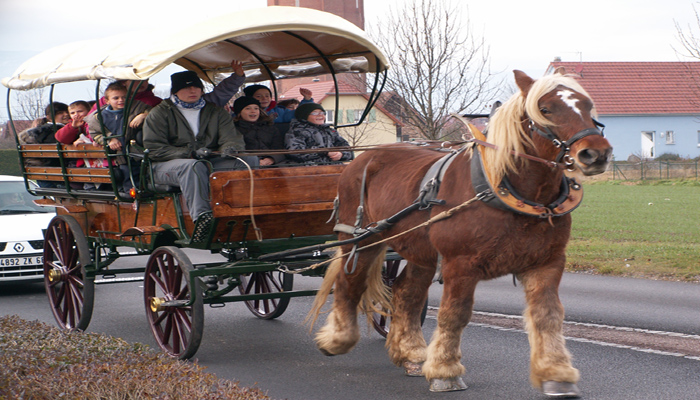Ungersheim, a former mining town in the Alsace region, has successfully implemented a local socio-ecological transition strategy. Their success was based on the town autonomously designing its transition pathway, instead of following French government guidelines.[1] As the mayor, François Mensch, tells us, there are three dimensions to Ungersheim’s autonomy. The first two obvious dimensions are energy autonomy and food self-sufficiency, the third being freedom of thought.[2]
In this spirit, this small town has begun a process of permanent ecological learning and improvement. A council consisting of 50 citizens regularly meets to put together proposals and develop existing projects. As Mensch emphasizes, Ungersheim greatly appreciates the génie collectif. Unconventional thinking, too, is considered a principle in Ungersheim, or, as the French call it, “leaving the box”: sortir du carton.
Background
Everything began with the desire to save and also produce energy to cut down on public expenditure. This led to different measures, the most important of which was solar heating for the city’s swimming pool. Moreover, the town also developed a small wood-fired heating grid. This development pathway then led to further projects, for example the instalment of small PV systems on the rooftops of public buildings, as well as a 17 million euro solar farm on a mining slag heap. The farm produces energy equivalent to that consumed by Ungersheim’s 3,000 inhabitants, turning the town into a showcase project for the Energie Partagée network. The town saved money and was able to cut expenditure. Unlike in all other towns in France, local utility charges have not increased since 2004.
A second focus of this transformation is local agriculture and culinary practice. In line with Rob Hopkins’ ‘transition town’ philosophy, Ungersheim attempts to produce its own food locally. [3] The community bought eight hectares of land and now grows organic food here, mainly for the school canteen. Nuclear energy is also an issue, as the Fessenheim nuclear power plant is close by. [4] Since the Fukushima accident in 2011, a political action group has been campaigning in the town for an exit from nuclear energy and the closure of Fessenheim.
Linking local ecology projects
Cooperative Multicarte, the cooperative founded in 2013 on the French national holiday of 14 July, will act as the umbrella organisation to link the numerous local ecology projects and help develop new ones. [5] Multicarte was founded as a cooperative precisely so that people in Ungersheim could invest in projects such as an organic brewery, more PV systems and eco-tourism. Profits will finance projects that are not yet profitable, such as the organic school canteen, political campaigns and education projects.
Up to now, the town has welcomed most of the projects with open arms, even the more extravagant ones. As the mayor says, some eyebrows were raised when the town bought an “eco-horse” in 2008 and put it before a carriage to replace the school bus. Among the school children though this cheval écolién is hugely popular.[6]
Ungersheim is an exemplary project for a process of socio-ecological transformation at the local level. Potash mining, previously the town’s main economic activity, has been successfully replaced. Noteworthy is the town’s comprehensive conceptualisation of autonomy that combines questions of energy supply with local, organic food production and a great degree of freedom of thought. It is commendable how transition is not conceived as a closed process. Rather, profits are reinvested and new ideas put into practice.
[1] Whether Ungersheim can actually be considered a peripheral town is debatable. Alsace, which includes Strasbourg and its large services industry, has the second highest per capita income in France according to Eurostat: www.ec.europa.eu/eurostat. Moreover, the town’s population is rising continuously. Still, with the end of potash mining at the turn of this century, the town’s economic basis disappeared. But Ungersheim lies close enough to the industrial town of Mulhouse for people who work there to commute. This has meant that different spatial dynamics superpose each other. The population decrease that is usually characteristic of peripheral towns does not occur here.
[2] Interview with François Mensch, mayor of Ungersheim.
[3] Hopkins, Rob: The Transition Handbook. From Oil Dependency to Local Resilience, Cambridge 2008.
[4] Built in the 1970s close to an area where earthquakes regularly occur, Fessenheim is considered particularly dangerous. France’s current president, François Hollande, wants to close Fessenheim, also because of the pressure from people on both sides of the Rhine.
[5] There is also a local currency which is so far accepted in twelve shops. In a town of 3,000 people, that is the majority of shops. Whether this currency will work has yet to be seen, but the people in Ungersheim certainly hope that it does.
[6] Rubbish collection and some public transport is also done by horse and carriage
This article is presented in the Energy democracy in Europe, A survey and outlook by Rosa Luxemburg Stiftung in 2014.
